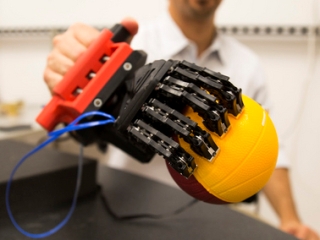Feb 11 2015
Organizers of the first Rehabilitation Robotics Workshop at Arizona State University in 2013 hoped it would generate at least enough interest to justify a second workshop two years later.
 Robotics hands, such as the one pictured here, are among technologies being developed to aid physical rehabilitation treatments. The ASU Rehabilitation Robotics Workshop will explore a wide range of topics related to using robotics to improve quality of life, and look at progress in robotics across different fields of science and engineering, including work in human-robot interaction and human motor control. Photo by: Jessica Hochreiter/ASU
Robotics hands, such as the one pictured here, are among technologies being developed to aid physical rehabilitation treatments. The ASU Rehabilitation Robotics Workshop will explore a wide range of topics related to using robotics to improve quality of life, and look at progress in robotics across different fields of science and engineering, including work in human-robot interaction and human motor control. Photo by: Jessica Hochreiter/ASU
Favorable reactions from many who attended the first event led to a change of plan. A second workshop was organized for the following year.
The events have resulted in participants forming research collaborations and teaming up to develop grant proposals – proposing ideas for taking new directions for studies, research and technology development in the field, said ASU professor and neurophysiologist Marco Santello.
“We got overwhelmingly positive feedback from the people who came to speak and present, from faculty and from students,” said Santello, who is director of the School of Biological and Health Systems Engineering, which presents the event.
The workshop is supported by a Virginia G. Piper Charitable Trust Health Solutions grant to the school, which is one of ASU’s Ira A. Fulton Schools of Engineering.
Now, a third ASU Rehabilitation Robotics Workshop is scheduled for Feb. 13 and 14 at the Memorial Union on ASU’s Tempe campus, with the expectation that it will remain an annual event for the foreseeable future.
The first two workshops attracted several leading experts in the booming field of applying robotics technologies to improving devices and systems for physical rehabilitation therapy.
ASU’s workshop explores the state-of-art robotics technologies being used in health care as well as the challenges in advancing rehabilitation robotics, and looks at a multitude of areas in science and engineering that are increasingly studying the potential of human-robot interaction.
“Rehabilitation robotics is drawing more people from various fields, from different branches of engineering, from physiologists, physical therapists, medical clinicians and others,” Santello said. “So interest should be high enough that we can continue to do the workshop every year."
In addition to researchers from universities and other research institutions, the first two events have drawn a notable number of industry representatives.
“It’s a strong indicator the workshop will remain viable,” Santello said.
For students, it offers a valuable opportunity.
“They are able to meet and talk to leading experts, something they would rarely be able to do otherwise,” he said.
The event is free and open to the general public, but registration is required. Visit the workshop website for more information.
This year’s Rehabilitation Robotics Workshop speakers include:
- Hunter Peckham, Donnell Institute Professor and director of the Functional Electrical Stimulation Center at Case Western Reserve University. Expertise: rehabilitation engineering neuroprostheses.
- David Reinkensmeyer, professor in the Department of Mechanical and Aerospace Engineering and the Department of Biomedical Engineering at the University of California, Irvine. Expertise: neuromuscular control, motor learning, robotics and rehabilitation.
- Paulo Bonato, director of the Motion and Analysis Laboratory at the Spaulding Rehabilitation Hospital. Expertise: rehabilitation engineering, biomechanics of movement, electromyography, wearable technology and robotics.
- Andrew Gordon, professor of movement science at Columbia University. Expertise: sensorimotor control, rehabilitation, constraint-induced movement therapy and bimanual training.
- Jose Luis Contreras-Vidal, professor of electrical and computer and biomedical engineering at the University of Houston. Expertise: reverse engineering the brain, rehabilitation robotics, neural interfaces, neuroprosthetics and powered wearable exoskeletons.
- Venkat Krovi, associate professor of mechanical and aerospace engineering, and gynecology and obstetrics at the University of Buffalo. Expertise: lifecycle treatment (conception, design, modeling, analysis, control, implementation and verification) of articulated mechanical and mechatronic systems for enhanced manipulation tasks.
- Vivian Mushahwar, professor of physical medicine and rehabilitation at the University of Alberta. Expertise: spinal cord injury and neuroprostheses rehabilitation.
- Catherine Lang, associate professor in the physical and occupational therapy program in the Department of Neurology at Washington University. Expertise: neurology and stroke rehabilitation.
- Frank Sup, assistant professor of mechanical and industrial engineering at the University of Massachusetts. Expertise: design, modeling and control of electromechanical systems with a focus on rehabilitation engineering.
- Elizabeth Torres, assistant professor in the Department of Psychology at Rutgers University. Expertise: cognitive psychology and computational neuroscience.
Joe Kullman, [email protected]
(480) 965-8122
Ira A. Fulton Schools of Engineering